
 The trunk contains letters, photographs and maps that tell more about the family. To begin putting the pieces of the puzzle together, read What We Know about the Kelsey family. As you carefully unpack the trunk, you take a close look at each new artifact.
The trunk contains letters, photographs and maps that tell more about the family. To begin putting the pieces of the puzzle together, read What We Know about the Kelsey family. As you carefully unpack the trunk, you take a close look at each new artifact.


Arrington, Frances. Bluestem. Philomel Books, 2000.
With their father away and their mother traumatized by the death of a child, eleven-year-old Polly and her younger sister are left to take care of themselves and their prairie homestead.
Conrad, Pam. Prairie Songs. Harper & Row, 1985.
A young pioneer wife has difficulty adjusting to the harsh conditions of life on the prairie, and becomes totally unable to cope after a tragedy hits.
MacLachlan, Patricia. Sarah, Plain and Tall. Harper & Row, 1985.
In the late 19th century a widowed Midwestern farmer with two children advertises for a wife, but when she arrives from Maine, she has trouble adjusting to life on the farm.
Turner, Ann W. Grasshopper Summer. Macmillan, 1989.
A boy and his family move from Kentucky to the southern Dakota Territory in 1874, where harsh conditions and a plague of hungry grasshoppers threaten their chances for survival.
Van Leeuwen, Jean. Nothing Here But Trees. Dial Books, 1998.
A close-knit pioneer family carves out a new home in Ohio in the early nineteenth century.
Wilder, Laura Ingalls. On the Banks of Plum Creek. Cadmus, 1937.
Laura and her family live in a dugout in Minnesota and face misfortunes caused by floods, blizzards, and grasshoppers.
Bial, Raymond. Frontier Home. Houghton, 1993.
Describes the challenges that settlers faced when creating a new home on the prairie.
Gillespie, Sarah. A Pioneer Farm Girl: The Diary of Sarah Gillespie, 1877-1878. Blue Earth Books, 2000.
Excerpts from the diary of Sarah Gillespie, a pioneer in Iowa in the nineteenth century. Includes activities, photos of artifacts, and a timeline related to the era.
Greenwood, Barbara. A Pioneer Sampler: The Daily Life of a Pioneer Family in 1840. Ticknor & Fields, 1995.
A blend of fiction and fact provides a full picture of mid-nineteenth-century pioneer life.
Isaacs, Sally Senzell. Life on a Pioneer Homestead. Heinemann, 2001.
An overview of life on a pioneer homestead including building a home, cooking, clothing, schools, and everyday activities.
Kalman, Bobbie. Pioneer Recipes. Crabtree, 2000.
An illustrated cookbook that features recipes from the many immigrant groups who settled in the Midwest. Describes how pioneers prepared their meals and gives step-by-step instructions on preparing recipes.
Patent, Dorothy Hinshaw. Homesteading: Settling American's Heartland. Walker, 1998.
Describes the activities of homesteaders who settled the prairies during the late nineteenth and early twentieth centuries. Includes building a home, starting a farm, and surviving on the prairie.
Toht, David. W. Sodbuster. Lerner, 1996.
Includes quotes from pioneers' diaries, verses from songs, old-time remedies, games, and recipes. Presents the hardships, as well as the good times, of pioneer life.
Warren, Andrea. Pioneer Girl: Growing Up on the Prairie. Morrow, 1998.
Describes the daily life and activities of a pioneer girl growing up on the prairies of Nebraska in the late 1800s. Includes living in a soddy, collecting buffalo chips for fuel, battling prairie fires, learning to quilt, surviving a drought, teaching school, and becoming a rancher's wife.
Life as a Pioneer - Why Move West?
A brief explanation of the push/pull factors which influenced many people to settle in the Midwest and West.
Life as a Pioneer- Traveling West
A brief description of the modes of travel used in Iowa during pioneer times, including maps of railroad lines.
Pioneer Farming - Life in a Log Home
Describes what it was like to live in a log cabin in pioneer times; including how cabins were built, how meals were prepared, and how housekeeping chores were done.
Pioneer Life in Ohio
A description of the hardships endured by Ohio pioneers in the mid-1800s. Includes information about pioneer food, medicines, cabin-raisings, and money.
Pioneers
Hinckley-Big Rock School District (Illinois) in conjunction with Southern Illinois University, presents information about toys, games, customs, crafts, clothing, farm life, and housing, including many photographs.
Settlers
Information about pioneer food, clothing, medicine, transportation, farming, games, and homes, including many photos.
The Domestic Frontier
Includes links to information on pioneer clothing, food, and home building.
Pioneer Recipes
Recipes for homemade soap, ice cream, and stew.
Introduction to Pioneer Farming
Describes the methods and tools used to cultivate Iowa farmland in the 1800s.
Not For Ourselves Alone
An interactive quiz about a typical day in the life of a Nebraska farm girl in the 1800s.
Dear Laura
Students may ask questions about pioneer life and have them answered by a historian at the Herbert Hoover Presidential Library.
Diary of a Young Girl
A reprint of a diary kept by Ellen Strang in the early 1860's. It contains a record of pioneer farm life including information on household chores, planting and harvesting crops, illnesses, and travel.
Millions of Acres for Sale Poster
A copy of a Land for Sale poster to entice people to come to Iowa in 1872.
Iowa Farm Letters - John and Sarah Kenyon
Describes a family's efforts to stop a prairie fire in Iowa in 1859.
Pioneer Farming - Journal of William Buxton
A diary of one man's journey from England to Iowa in 1853 includes descriptions of travel by steamship, train, steamboat, rail, and stagecoach.
Pioneer Farming - Pioneering at Bonaparte and Near Pella
Sarah Welch Nossaman's recollections of the hardships she experienced on several Iowa farms where her family lived in the 1800s.
conservator - A person in charge of taking care of or restoring objects, photographs, and materials so that they remain in good condition and last a long time
curator - A person who manages or oversees a museum collection
excursion - A going out or forth; deviation from a direct, definite, or proper course
historian - A person who writes or compiles a chronological record of events and investigates and interprets the past by researching original sources like objects, photographs, letters and other documents to find out more about individuals and groups of people
plat map - A map showing actual or planned features, such as streets and building lots
immigrant - One that immigrates; a person who comes to a country to take up permanent residence


Cedar Rapids
February 16, 1849
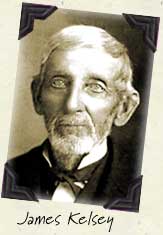 Dear Parents Brother & Sisters and all to whom these presence may concern,
Dear Parents Brother & Sisters and all to whom these presence may concern,
I J. H. Kelsey of the Town of Cedar Rapids County of Marion State of Iowa of the first part to the above named individuals of the second part doth Send greeting and sayth that I of the first part am enjoying good first rate and ever to be thankful for the enjoyment of Life Health Liberty and the freedom of Speech and the Press and hope that the above named Parties of the first part are enjoying the Same blessing.
You seem according to your letter to be under a great mistake concerning that land you think part is across the river and would not be convenient to get at and therefore came to the conclusion that it is best not to buy it. But it is all on one side of the river and is highly necessary in order to make a good farm. To have it, and it can be sold any time for as much again as we have to give for it.

I have drawn a map of the Farm as near as I can with a description of the same and by buying the Fraction of 65 acres we can keep the 30 odd and nothing will be said about it as it is so small a person looking on the Map will overlook it.
I think by measurement in the 65-acre lot there are 75 acres or more as the fractions are always underrated in the general survey. They want to make the rivers as large as possible and by that means all the fractions are larger than they are named on the map, which I think looks very reasonable. You will see by the map that is herein enclosed that it is highly necessary it should be added to the present farm.

There is not timber enough on the farm to support it if we intend to make it a homestead. And I am so much afraid that some one else will enter it away from us that I hardly know what to do some times. If we do not get the timber land the first man that I can trade it to will get it as I consider that the most valuable part of the farm as timber is very scarce here and every body is anxious to get some timber land.

You wished to know which is the best cheapest and quickest way to come to this place. I cannot tell at present. I have written to a friend in Dubuque to find out and let me know. As soon as he does I will send you word.

You wish to know about the markets here and a great many other things. I have given you a correct statement in a former letter but whether you have even received it or not I cannot say and for fear you have not I will give you another. I am 75 miles from Dubuque, 60 from Bloomington, 23 from Iowa City (the Capital), and 5 from the county seat that is to be moved to this place. The Railroad is to go through this place….

…I have received my card from the lodges and so had green. I should like to go to California this spring as the best men we have in this part of the country are going. All those that wish to go say now is the time and all that wish to embark in the Gold Expeditions now is the time. Next spring may be everlastingly too late and if you hear of my being there you must not be surprised.

I wish you would answer that letter that I last wrote. I said all in that letter that I thought necessary On that map the 80 and two fortys are entered and all we need to make a good farm is the odd 65 acres.
John H. Kelsey
* This letter has been edited slightly to make it more readable for 21st century readers. The challenges of transcribing a 19th century handwritten letter include changes in spelling, punctuation and usage.

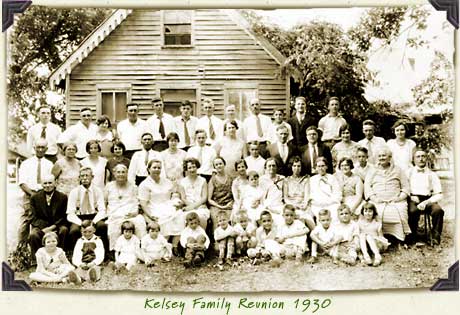

 Cedar Rapids July 4, 1854
Cedar Rapids July 4, 1854
Dear Mary,
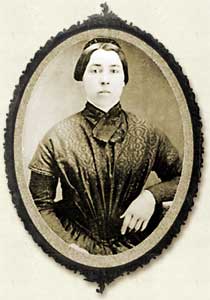
What are you about on this great day of our country? I presume to say you did not go to Middleport. Have you any kind of doings about there? I'll tell you what we are about. Father is sitting in the front door enjoying the pleasant breeze. Mary is on the lounge. Catherine is in the large Rocking chair. James is sitting on the side of the bed. I am at the stand before the bedroom window, etc.
We concluded on the whole we would roast our pig and eat it here. So we had our dinner of roast pig, green peas, new potatoes and other chicken fixing. James invited a poor old gentleman residing in the next house to dine with us. We enjoyed our dinner very much.
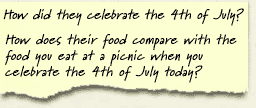
The Methodist S. Society has a fair this evening. I presume some of us will go down. The avails of the dinner and fair go towards erecting the Church. They have the foundation and other preparations. The location is a very pleasant one. I am sorry Elder Fillmore's time is out. Sorry for the people for I think but few men can fill the station as Elder Fillmore can.
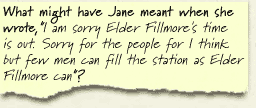
I have not attended a Quarterly Meeting since I came here. They have all been at a distance except one that was in town. The weather was then very inclement. We did not go. I have heard Elder Bowman preach once. Liked him very much. Oh! How I would have liked to hear Elder Fillmore's sermon to the children. Yes I can see how he looked when he told them how very "honest" they must be.
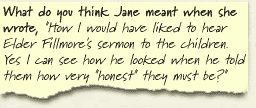
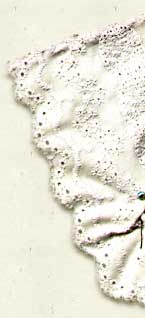 The lace came very safely. I put it on my bonnet and wore it last Sunday.Idid not mention the quantity for I did not know myself. There was enough and I thank you very much till you are better satisfied. You did not tell me how much the expense was.
The lace came very safely. I put it on my bonnet and wore it last Sunday.Idid not mention the quantity for I did not know myself. There was enough and I thank you very much till you are better satisfied. You did not tell me how much the expense was.
I guess you thought rather strange to find some letters for the girls in my last. It was some of my economizing. I wrote to all of the girls at the same time and when we came to put them up the budget was too heavy so I tucked a part in yours.

I have thought of another thing. When you have an opportunity, send my rolling pin that was in the back room, the foot cushion, there is a little book in the kitchen book cupboard that I used to claim, and I have wished for several times as a book of reference, The Mother's Catechism I think.
Father talks of going east this summer but it is so warm at present we do not like to have him start. I saw in the Buffalo Advocate notice of the death of Mr. Curtis Graham of Black Rock, aged 67. I suppose that must be Hannah's father.

But I must close. If I go to the fair James says, "tell them I am well and will write to them some time." The crops are very promising. The winter wheat is nearly ready to cut. Spring wheat is ripening. Oats look beautiful. Some of the corn is higher than James can reach and it is in tassel.
How does Charley get on with his farm or do you not hear anything of him? Has he got that housekeeper yet, he was talking about one evening? I wish Jane Ann much joy with her "Gal boy."
Best wishes for all the friends and neighbors, Sunday school Class, Superintendent, Teachers, Minister, etc.

And now a Good bye till some other time. I have been thinking if Orendo could only leave at this season of the year. Now is the most pleasant time to see the country.
Yours etc.
H. J. K.
* This letter has been edited slightly to make it more readable for 21st century readers. The challenges of transcribing a 19th century handwritten letter include changes in spelling, punctuation and usage.
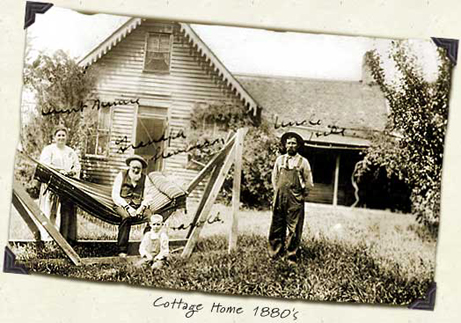
"Cottage Home" Iowa
September 20, 1863
Dear Brother & Sister,
Yours of August 1st was duly received but the babies were sick by spells, sometimes one and sometimes the other, then both. I thought I would wait a little to see how the case would turn. As they had no teeth I supposed they were undergoing the process of teething.
Sometimes they would have very bad diarrhea accompanied by a good deal of fever. Sometimes with vomiting etc. Louise being delicately formed and apparently very frail was not able to endure. Aug 21st she left us, a weeping circle, to join the throng of happy ones in the Spirit Land.

She had been better for a few days while Louis was worse. I had succeeded in removing her diarrhea and hoped she would be better. Through Wednesday night she cried out occasionally as though in extreme pain. Thursday seemed weak and not inclined to amuse herself at all. She took not much notice of playthings.
In the afternoon she commenced coughing attended with very laborious breathing. Through the afternoon and evening I applied mustard occasionally thinking perhaps inflammation of the lungs has set in. The symptoms did not abate. Rather they increased. Whenever she attempted to cough she would scream as though suffering extreme pain. At midnight James got up and got me some smartweed while I kindled the fire and made preparations to administer fomentations. All the while the conviction was silently stealing over me that she would not be with us long.

As James was very weary threshing and expected to go at it again in the morning, I told him he had better lie down while I attended to the baby. As I laid the hot flannel on the first time I breathed a prayer that it might relieve her at least. Her cough immediately subsided and she gave but little indication of pain. I attempted to pray for her restoration but I could not. I could find no words to express any such desire. So I bowed before the evil that I saw was smiting me and prayed for resignation.

Here I had my trial alone with my God and my dying child. The fiery ordeal was passed. Though weeping, my soul was calm and peaceful. She gradually failed. Life was ebbing out. At three I observed her sight was gone. After a while I called James between 5 and 6. I called the children to see their sister die, but she lingered till nearly noon.

As I watched her, I felt the full force of the words "Suffering almost over", and I could not help but feel glad for her though it was going to make such a breach in our family circle for she was really a little sunbeam that for a brief space has shone upon us. Her patient, calm look and ways often reminded me of Mother. She needs no more of our care. The Eye that never sleeps watches over her. The hand that never tires supplies all her wants. And as I know she cannot return to me I often ask myself the question shall I go to her? Oh that I may not miss of seeing her in Heaven.
Louis has become better, much better indeed, but this afternoon symptom rather unfavorable again. No teeth yet. The rest of the family are well, and are blessed with good substantial appetites. I can hardly get enough bread baked or potatoes enough cleaned.
9 O'clock Monday evening--James has just taken the baby to bed. All are still. I took off my shoes thinking I too would retire. I thought of my letter, stepped to the secretary and now I am sitting by the table in the dining room close by the bedroom door. I thought if I were at the old house at home I should not retire quite so early judging by the sittings we had when I was there.

A son-in-law of Mr. Witmer (Philip Newhouse by name) was here last week. I think he said he left Wheatfield the 7th, got to Cedar Rapids the tenth, and is now living on this side of the river. Mr. Witmer intends to move on in the spring. Mr. N. had not seen any one of the friends proper. He was down in the north woods a few days before he started but did not go to Robinson's. I want Mr. Witmer to see some of you before he comes, either at his home or yours or both. Then it will seem as though I had seen you myself.

James has been rigging his molasses mill today. Intends to start it tomorrow. I am afraid molasses will be a poor show this season. It has not been very favorable for cane. We have had too many frosts to make it very good…

…There has been no drafting about here, it is thought by some there will not be. You ask how I feel about it. I felt as though I could not be left. It would be very unjust to oblige my husband to go. But I have rested quite easy so far this time for, he being a married man between 35 & 45 it is quite likely he will not be called out this time, unless there should be order for another draft. If it comes to the worst that he must go I must do the best I can. He would have been in the field at the first call, had he not thought his services were required here.

I see you keep up the visiting yet, visit a little for me once in a while. I have about 1/2 of my dried fruit yet in very good condition. I seldom get any of it but I think of the time when we were all gathered around the well-filled baskets in the old kitchen, and I "cut off ten". Our number gradually diminished, till but 4 of us were left. And now but one out of that large family sits under the shade of the old balsam tree.

Sometimes I think it cannot be but that you must be lonely indeed as you take a retrosptive view of the past. I often feel lonely when I think of our diminished number here, especially when I look into the trundle bed. Louise slept with Ettie, after it came warm weather, close by the side of our bed. I now count but three girls in the trundle bed. There is a vacant place. Johnnie Hiker and Eric sleep in the other bedroom.
Write soon,
H.J. Kelsey


* This letter has been edited slightly to make it more readable for 21st century readers. The challenges of transcribing a 19th century handwritten letter include changes in spelling, punctuation and usage.

| Color Map | Close-up map | Kelsey Bend Map | Plat Map |
| 1859 | 1859 | 1859 | 1859 |
| 1906 | 1906 | 1906 | 1906 |
| 2001 | 2001 | 2001 | 2001 |


As a team of curators, describe exactly what you see in this photograph. Your description should help someone who has not previously seen this image, to visualize it.
Place your team of curators into partner groups. Divide the questions below among your partner groups. When each group has formulated inferences about the photograph, convene your group and share your observations.
List the questions you will need to research in order to learn more about this photograph.
*Questions were adapted from a list written by Loren Horton, former historian with the State Historical Society of Iowa, and from worksheets on the American Memories collection.

Copyright © 2022 CampSilos | All Rights Reserved
National Standards | Silos & Smokestacks | Credits | Awards
Crafted by IFC Studios, a midwest Branding Agency.